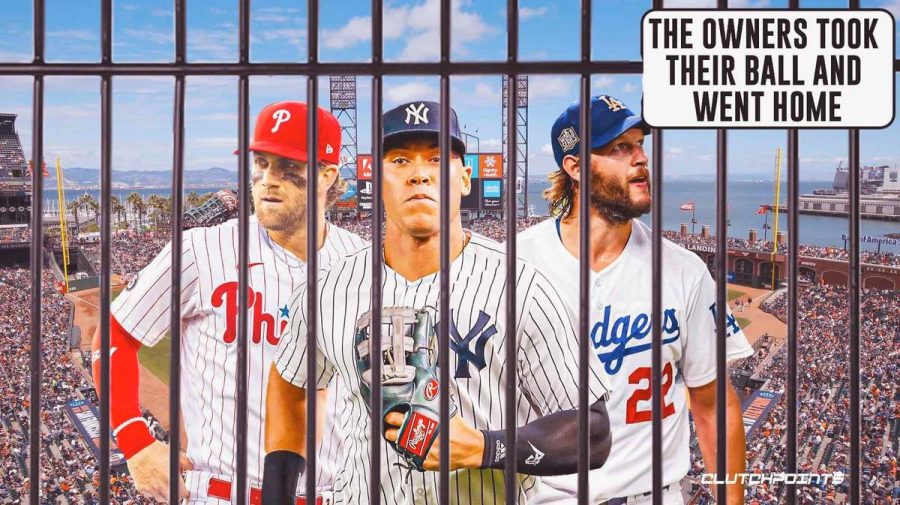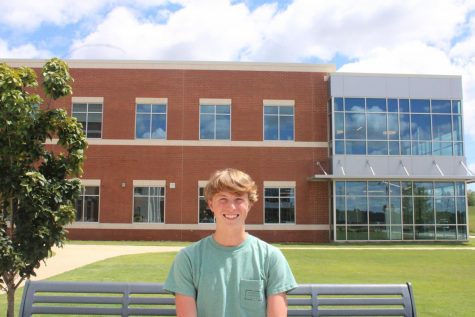Major League Baseball’s Lockout Dilemma
What caused the stoppage of work in the MLB, and how it will affect the season
Photo courtesy clutchpoints.com
The MLB lockout left many fans concerned, with the future of their favorite players being uncertain at the time.
On Dec. 2, 2021, the MLB entered a lockout that would last nearly 100 days, until March 10, 2022. This may sound exciting, but the MLB lockout was more than just something that came and went; it could have massive effects on baseball in America as people all know today.
A lockout in general is a work stoppage implemented by owners or management of a corporation or business during a labor dispute with their workers. There have been several lockouts throughout baseball in the past, including the most notable in the 1994-94 Major League Baseball season that ended up canceling the World Series that year. In the case of the MLB, owners froze all transactions within the major league clubs, and did not allow teams to communicate with their players. A major part of these discussions was the Collective Bargaining Agreement (CBA) that was enacted as the agreement between the Major League Baseball Players Association and Major League Baseball, and it described the rules of employment and financial structure of the game.
Anna Claire Transiskus (11) is on the varsity softball team, and follows MLB action as it occurs, including the lockout. She narrowed the cause of the lockout down to a basic function of need and rejection between the players and the owners.
“The lockout was caused by the last CBA (Collective Bargaining Agreement) between Major League Baseball and the MLB Player’s Association,” Transiskus said. “They couldn’t agree on certain aspects of the game, so they had to freeze all player trades/moves/transactions until they could reach another CBA.”
These certain aspects of the game included (but are not limited to) the idea of tanking or intentionally losing in order to receive higher draft picks in the MLB Draft by being a worse team. Another prominent concern held by players was the compensation for young players and what they would receive monetarily, as they tended to be given the shorthand when it came to payday. Although these specific issues were not directly solved and addressed, they did set a spark within the negotiations that were to come.
After months of talks between the MLB Player’s Association and the MLB, the two sides finally came to an agreement. They plan to work towards making more progress towards giving players a voice and creating more awareness for tanking and its negative impact upon the sport. But these ideas are still not set in stone. The only concepts that we do know are in the works of being passed as of now are illustrated by Bob Nightengale of USA Today. In an FAQ by Zachary D. Rymer on bleacherreport.com, Nightengale was used as a source of evidence when Rymer was asked about the stance of baseball as a result of the lockout.
“According to Bob Nightengale of USA Today, MLB and the MLBPA have agreed to at least three things. One: The designated hitter will permanently go universal. Two: Top-level free agents will no longer be tied to draft-pick compensation. And three: The playoff field should expand,” Rymer said.
Although the issue has been resolved for the moment, many fans of the MLB are concerned that the MLB lockout could have potential long-term effects on the game. The most prominent of issues is the fact that the players and the owners involved in the MLB do not see eye to eye with most issues, which is bound to resurface as a point of discussion in years to come. While these issues will be a point of controversy, Peyton Naylor (11), a member of the varsity baseball team, believes that it is these conflicts that the most solutions and compromises will occur.
“Both groups gave up certain things that they didn’t want to in order to achieve their main goals,” Naylor said. “For example, the owners wanted to increase the minimum salaries of players, which is something they didn’t want to do, but in return got a larger postseason.”



